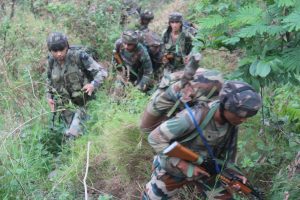The Indian government has reimposed a draconian counter-insurgency law in some parts of the northeastern state of Manipur following spiraling ethnic strife that originated last year.
The Armed Forces (Special Powers) Act or AFSPA has been re-promulgated in areas under six police stations in Manipur’s Imphal valley, and Jiribam in the western fringe of the state.
Explaining the rationale of the decision, the central government said that Manipur’s situation continued to be “volatile” with evidence of the involvement of insurgent outfits in acts of violence. The notification added that the law was necessary for “well-coordinated operations” by security forces to maintain law and order and curb the activities of insurgent groups.
The controversial law was promulgated in Manipur in 1980 following increasing instances of insurgent violence. In 2004, the government repealed the law from the municipal areas in Imphal spread over seven assembly constituencies. Again, during 2022-23, the law was withdrawn from areas under 19 police stations in the valley.
The origin of the AFSPA can be traced to the British colonial regime, which promulgated the legislation during the Quit India movement in 1942. After India gained independence five years later, Prime Minister Jawaharlal Nehru retained the act owing to disturbed conditions in the Naga-inhabited areas in the country’s Northeast.
Currently, the law is also operational in Nagaland, parts of Assam and Arunachal Pradesh in the country’s Northeast, and Kashmir. The AFPSA can be imposed by the central and state governments in a state or parts of it after areas are declared “disturbed’’ under the act.
The act empowers the armed forces to open fire, even causing death, against any person carrying weapons. It allows armed forces to arrest individuals on the basis of “reasonable suspicion” and search premises without warrants. It also provides impunity to the security personnel involved in such operations, as no legal proceedings can be initiated against them without the prior approval of the central government.
Not surprisingly, Manipur’s Imphal valley has erupted in protests against the reimposition of the law. On November 16, enraged mobs ransacked the houses of three ministers and six legislators in Imphal. The Manipur government has requested the central government to withdraw the AFSPA from areas falling under the jurisdiction of six police stations in the state.
The central government was prompted to reimpose the AFSPA in the backdrop of the continuing ethnic strife in the state that began in early May 2023. So far, at least 258 people have been killed in the violence, including militants. Over 50,000 displaced persons are lodged in refugee camps across the state.
The latest incident occurred in Jiribam, where a woman from the Hmar community was killed and many houses set ablaze, allegedly by the radical Meitei outfit Arambai Tenggol. Subsequently, militants belonging to a Kuki outfit killed six women and children after they were abducted from a refugee camp from the same locality. Amid these episodes, ten Kuki militants were killed in a fierce gun battle with paramilitary troops.
The same pattern of violence has been discernible in Manipur since last year with rival groups belonging to the Meitei and Kuki-Zo communities attacking each other and retaliating in their respective areas of dominance across the state. Sharp boundaries have been erected between Imphal valley, inhabited by the majority Meitei, and some of the surrounding hill districts where the Kuki-Zo communities live.
The central government has rushed additional troops to maintain law and order in Manipur. Around 40,000 personnel from central forces such as the Assam Rifles, Central Reserve Police Force (CRPF), Sashastra Seema Bal (SSB), Border Security Force (BSF), and the Indo-Tibetan Border Police (ITBP) are currently deployed across the state besides the police and army.
However, peace remains elusive in Manipur despite the deployment of additional forces in the state. In March, the state government set up a reconciliation team under the chairmanship of Dinganglung Gangmei. Chief Minister Biren Singh was quoted as saying that talks have started with elected representatives who have abstained from attending the assembly session to restore peace and normalcy in the state.
These efforts have not yielded any result so far. Meitei umbrella organization Coordinating Committee on Manipur Integrity (COCOMI) and the Committee on Tribal Unity (COTU) representing the Kuki-Zos have snubbed the resolutions adopted by ministers and legislators of Manipur’s ruling Bharatiya Janata Party (BJP) and its allies to reinstate peace and normalcy in the state.
The Kuki-Zo, who share ethnic ties with some communities in the neighboring Indian state of Mizoram, and across the border in Myanmar, are demanding a separate administration to be carved out of Manipur, alleging discrimination and disproportionate sharing of resources and power with the Meiteis. The state government and civil society groups in the valley are reluctant to accept the demand.
Multiple issues including cross-border ones have combined to produce deep faultlines in Manipur. It could take a while before the mistrust and insecurity between the Meitei and Kuki-Zo communities are eradicated and peace is restored.

































